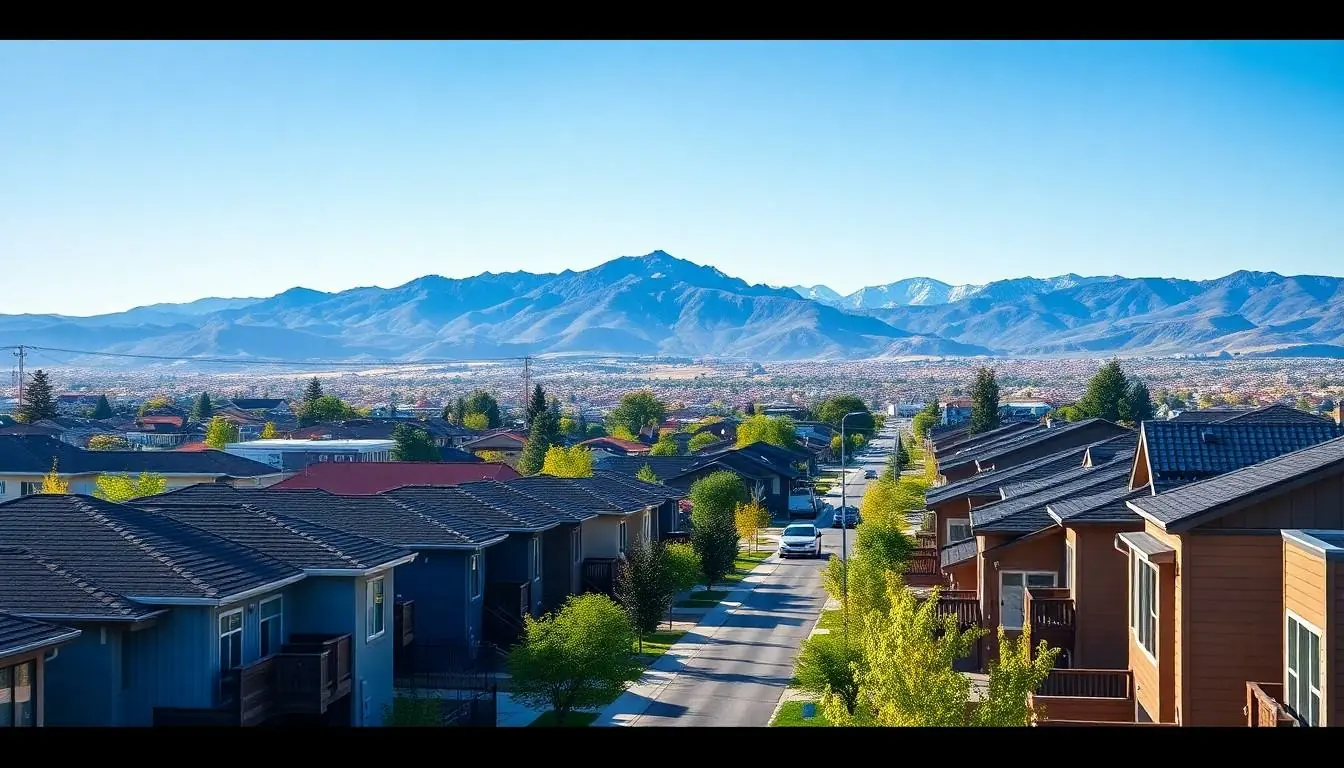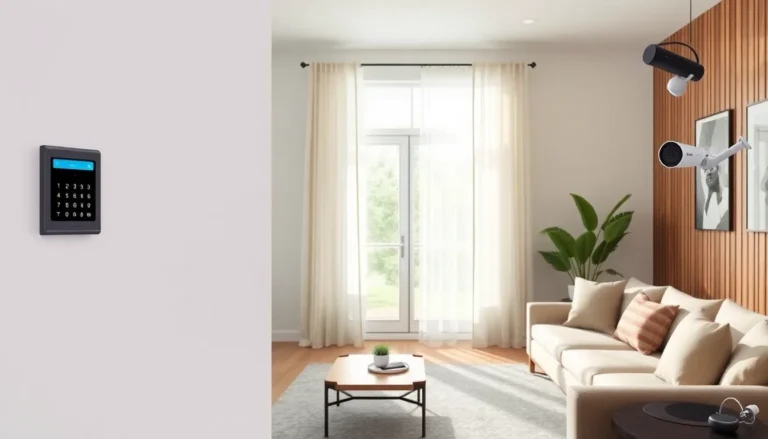Denver’s real estate market is hotter than a jalapeño in July. With stunning mountain views and a vibrant cultural scene, it’s no wonder people are flocking to the Mile High City. But what’s really going on beneath the surface? Trends are shifting faster than you can say “Rocky Mountain High,” and savvy buyers and sellers need to keep their eyes peeled.
Table of Contents
ToggleOverview of Denver Real Estate Trends
Denver’s real estate market continues to thrive, driven by its stunning mountain views and vibrant cultural scene. As of 2023, the median home price in Denver stands at approximately $600,000, reflecting an increase of 5% compared to the previous year. Increased demand characterizes the current market, with a low inventory of homes available for sale. This limited supply contributes to competitive bidding situations, particularly in sought-after neighborhoods such as Wash Park and LoHi.
Interest rates have fluctuated, influencing buying power and affordability. For instance, 30-year mortgage rates average around 6.5% this year. Consequently, some potential buyers explore alternative financing options, including adjustable-rate mortgages. Additionally, affordability challenges prompt a shift toward more entry-level homes and condominiums, offering a viable option for first-time buyers.
Rental prices also reflect rising trends, with the average monthly rent for a two-bedroom apartment reaching $2,200. Strong rental demand exists due to the influx of new residents, many attracted by job opportunities in tech and healthcare sectors. Investors recognize this trend, leading to increased purchase activity in multi-family properties.
Noteworthy are the emerging neighborhoods showing signs of appreciation. Areas like Globeville and Elyria-Swansea experience revitalization and community investment, resulting in appealing development projects.
Overall, understanding the dynamics of the Denver real estate landscape is crucial for buyers and sellers to navigate the rapid changes effectively.
Current Market Conditions

Denver’s real estate market remains dynamic, influenced by a mix of factors that continue to shape trends throughout 2023.
Home Prices
Home prices in Denver reflect steady growth, with the median price pegged at $600,000. This figure marks a significant 5% increase compared to 2022. Popular neighborhoods, like Wash Park and LoHi, often command even higher prices due to their desirable locations. Competitive bidding among buyers further drives prices upward, especially in these sought-after areas. As new residents flock to the city, demand for affordable homes also rises. Buyers increasingly prioritize homes that offer both value and location, contributing to upward pricing pressure.
Inventory Levels
Inventory levels in Denver remain critically low, creating a challenging environment for home buyers. Current listings fail to meet demand, leading to heightened competition. As of 2023, many neighborhoods struggle with fewer options, which drives up prices. Potential sellers often hesitate to list their properties, fearing they won’t find suitable replacements. Emerging neighborhoods like Globeville and Elyria-Swansea experience revitalization, yet overall inventory still lags behind demand. Consequently, buyers may face multiple offers on desirable homes, emphasizing the importance of prompt decision-making.
Factors Influencing the Market
Multiple factors influence the Denver real estate market, shaping trends and affecting buyer behavior. Understanding these elements helps navigate the current landscape effectively.
Economic Indicators
Strong economic indicators significantly impact the Denver real estate market. Employment rates remain high, fueled by growth in tech and healthcare sectors. Median home prices reached around $600,000, marking a 5% year-over-year increase. Fluctuating interest rates, averaging about 6.5% for 30-year mortgages, affect buyers’ purchasing power. Rising rental prices, with two-bedroom apartments averaging $2,200 monthly, highlight the ongoing demand driven by new residents. Monitoring local economic conditions, including job creation and inflation rates, ensures awareness of market shifts.
Population Growth
Population growth markedly influences demand within Denver’s real estate sector. Recent years show an influx of new residents, attracted by job opportunities and a vibrant lifestyle. Approximately 100,000 new residents entered the area over the past five years. Emerging neighborhoods like Globeville and Elyria-Swansea appeal to newcomers, spurring investment and development. Various amenities, including parks and dining options, enhance community appeal. Sustained population growth indicates stronger demand for housing, intensifying competition for available homes. Understanding these dynamics becomes essential for both buyers and sellers navigating the market.
Neighborhood Spotlights
Denver’s real estate landscape features several neighborhoods that stand out in today’s market. High demand and ongoing revitalization characterize these areas, making them popular among homebuyers and investors alike.
High-Demand Areas
Wash Park and LoHi frequently rank as top-choice neighborhoods for buyers. Their vibrant atmospheres and proximity to amenities draw significant interest. In these locations, homes often receive multiple offers due to competitive bidding. As of now, these neighborhoods reflect median home prices above $700,000. Features like parks, dining options, and nightlife enhance their appeal, thus, prospective buyers should act quickly to secure properties.
Emerging Neighborhoods
Globeville and Elyria-Swansea show substantial signs of revitalization, attracting new residents and investors. Community investments enhance these areas, making them desirable for future development. Average home prices in these neighborhoods remain around $450,000, providing opportunities for affordable entry into the market. Local amenities and improving infrastructure create a dynamic environment for families. An influx of new residents increases demand, indicating promising growth potential in the coming years.
Future Predictions
Current trends indicate that the Denver real estate market is on a transformative path. Short-term volatility will likely shape buyer and seller strategies.
Short-Term Outlook
Short-term predictions suggest that home prices may continue their upward trajectory, driven by high demand and low inventory. Buyers in competitive areas can expect bidding wars to remain common, particularly in neighborhoods like Wash Park and LoHi. Interest rates, which average around 6.5%, may impact affordability, guiding some buyers toward alternative financing solutions. Inventory levels remain critically low, with less than two months of supply available, exacerbating competition among potential homeowners. Sellers who are contemplating entering the market might face a favorable environment due to ongoing price increases.
Long-Term Trends
Long-term trends highlight significant urban development and demographic shifts. The influx of about 100,000 new residents over the last five years signals sustained demand for housing. Neighborhoods such as Globeville and Elyria-Swansea are set for revitalization, making them prime targets for investments. Job growth in tech and healthcare correlates with a growing population, pushing demand higher. As such, average home prices expect to rise, reflecting a broader economic recovery. Future projections indicate that Denver’s real estate market will remain robust, attracting new residents and investors seeking opportunities amid evolving conditions.
Denver’s real estate market is poised for continued growth driven by strong demand and limited inventory. As new residents flock to the area for job opportunities in thriving sectors like tech and healthcare, competition for housing is expected to intensify. Emerging neighborhoods are becoming increasingly attractive for buyers seeking value amid rising prices.
With fluctuating interest rates and the potential for bidding wars, both buyers and sellers must stay informed about market dynamics. Understanding local trends will be vital for navigating this competitive landscape. The future looks promising for Denver’s real estate, making it an appealing destination for investors and homeowners alike.



